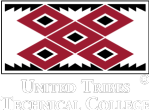In 2019, United Tribes Technical College reached 50 years as a tribal college. The start of job training classes in 1969 was an outcome of tribal resistance to government policies aimed at diminishing tribes and terminating their existence.
During the early 1960s, leaders from four North Dakota tribes joined forces specifically to address the possibility that state authorities might assume criminal and civil jurisdiction over Indian reservations. The tribes were: Devils Lake Sioux Tribe, Standing Rock Sioux Tribe, Three Affiliated Tribes of the Fort Berthold Reservation, and the Turtle Mountain Band of Chippewa Indians.
Since the 1953 enactment of Public Law 280 (PL 280), state officials had discussed and debated the merits and consequences of greater state jurisdictional control over the affairs of Indian people. North Dakota voters weighed-in during the June 1958 Primary Election authorizing the legislature to have the state assume jurisdiction as provided by PL 280.
Tribal leaders in North Dakota took exception to the prospect of losing authority on their sovereign lands. During sporadic meetings beginning in 1963, they established a united front opposed to several pieces of state legislation. Ultimately they succeeded in making North Dakota a PL 280 “option state.” Partial jurisdiction could be assumed by the state only with tribal consent. None of North Dakota’s tribes have concurred.
Aided by the state Indian Affairs Commission, they pursued other mutual concerns. Interactions with representatives of federal and state economic development agencies highlighted the opportunity and need for an organization to coordinate a statewide tribal planning grant. The result was formation of United Tribes of North Dakota. In 1968, the group incorporated as a non-profit under the title United Tribes of North Dakota Development Corporation. This became the coordinating entity of federally-funded inter-tribal programs.
When Bismarck’s Ft. Lincoln became available, the tribes worked hard to secure the 105-acre former military post as a training center for Indian families. The facility they established became United Tribes Employment Training Center, later named United Tribes Technical College.
Austin Engel, Frank Morin and Robert Fox in UTNDDC Workshop Meeting Minutes, Feb. 22, 1972, p.1-8; Austin Engel interviewed by David M. Gipp, June 7, 2004, UTTC Archive; North Dakota Indian Affairs, 1949-1999, 50 Years of Tribal/State Relations, Anniversary Report, July 26, 1999, p.20-22; United Tribes News, Vol.1 No.1, Oct-Dec. 1970, p.1; The Rights of Indians and Tribes, ACLU Guide, 1992, p.117
